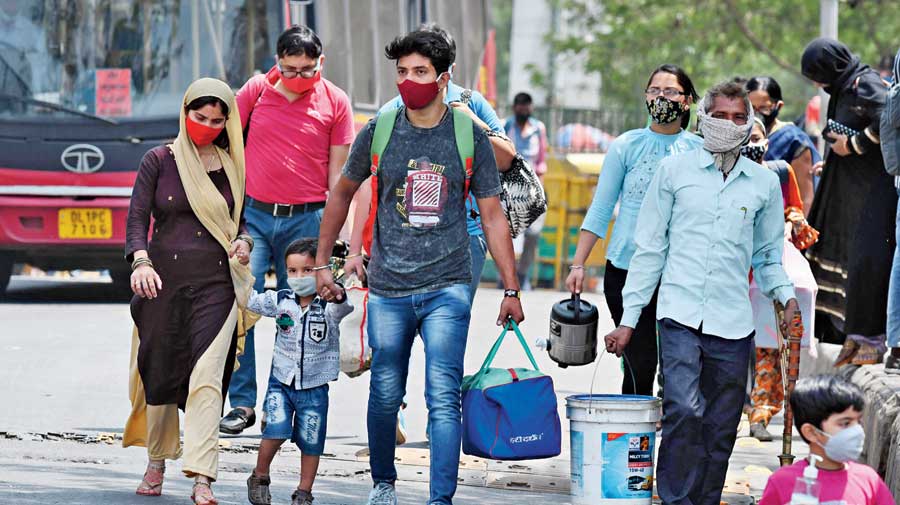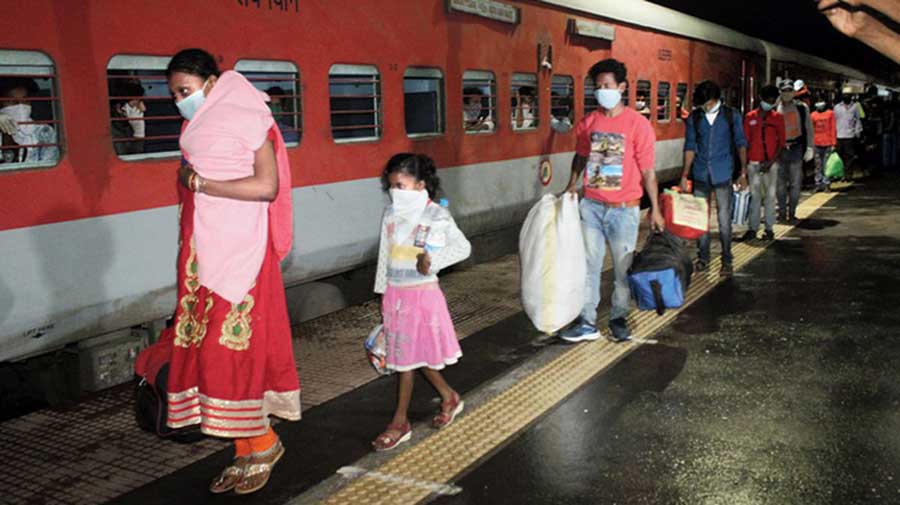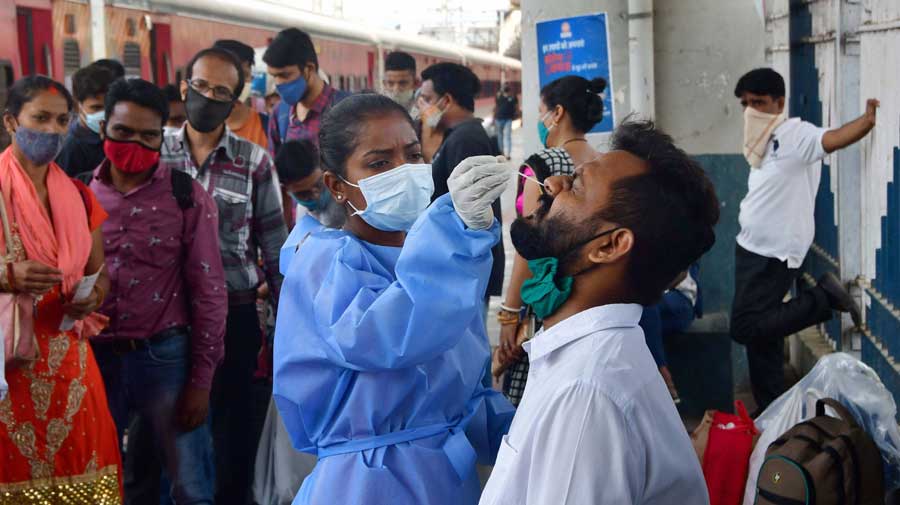Durga Prasad, a loader in southeast Delhi’s Okhla Industrial Area, has seen many of his fellow migrant workers leave Delhi, spooked by fears of another lockdown amid the resurgence in Covid infections.
He told The Telegraph he was staying put, at least for now, but would greatly welcome some sort of government assurance that the migrants would not be left in the lurch if a lockdown was indeed imposed.
“I have four children in Delhi government schools but they’ve been closed for a week now (after the higher classes had reopened recently). I lost my job in a cable factory last year and have been a day labourer since. I’m struggling to repay the loans I took last year,” Prasad said.
“My family in Azamgarh (Uttar Pradesh) is calling us back. If the government can just give us an assurance of some work if there’s a lockdown and promise us rations, we won’t have to leave. We don’t want to leave.”
Not all of Prasad’s peers think like him. Although Delhi has not seen jam-packed outbound trains the way Covid-ravaged Mumbai has in recent days, a steady stream of working-class families has been making its way to the Anand Vihar bus terminus to head to their homes in the east.
Anindita Adhikari of the Stranded Workers Action Network, a non-government body, said the current migration owed not to job losses but to fears of another lockdown like last year’s. A government assurance, therefore, could help ease the workers’ mind, she said.
Delhi has recently imposed night curfews and reduced the volume of public transport amid a rise in the positivity rate of Covid tests from less than 1 per cent to around 10 per cent over the past few weeks.
“The government should issue a statement that the workers will continue to receive wages and the industries will continue to operate,” Adhikari said.
She conceded that the workers were “unlikely to take this at face value because of what they faced last time”. Still, she said, the government should “use its database of the phone numbers of the people who took special trains, used ration coupons and so on (last year) to send them messages that reassure but do not cause alarm”.
Amid the flurry of notifications imposing more restrictions on gatherings and the enhancement of medical facilities, the Delhi government has been silent on migrant workers.
A source in the ruling Aam Aadmi Party said its leaders were wary of spreading alarm, which might lead to rumour-mongering.
“Last time, there were rumours that we were assisting migrants to leave as we allegedly wanted to withdraw their subsidised power meters and ration cards,” he said.
“As of now, we don’t think that we should do anything, but food distribution will start immediately at 2,000 government schools if a lockdown is imposed. We have also learnt from Kerala, which successfully delivered food packets at doorsteps last year.”
On Sunday, chief minister Arvind Kejriwal said in a webcast: “If you cooperate and the hospital facilities stay under control, we won’t have to impose a lockdown in Delhi. However, if the number of beds in hospitals starts falling short, we might have to impose a lockdown. I’m not in favour of a lockdown.”
Chandan Kumar, national coordinator of the NGO Working People’s Charter, said that simple steps could prevent an exodus like last year’s.
“Let the chief ministers of the industrialised states publicly request the workers not to leave and proactively register migrant workers for social security schemes. Right now, not one government is saying: ‘Don’t panic, come to your local government school and avail the benefits of the public distribution system’,” he said.
“We found that 70 to 80 per cent of the migrant workers had returned (to their workplaces) after Chhath and Diwali last year but most did not bring their families along. Only a few are returning home right now as the rural economy cannot sustain them, but fears of a lockdown and uncertainty about daily-wage work is weighing on their minds as they know the State will do nothing.”
The experience of Mohammed Guddu, who quit his tailor’s occupation in Delhi during last year’s lockdown and returned home to Darbhanga in Bihar, bears out both Kumar’s warning about an inhospitable rural economy back home and his plea for a government assurance to migrant workers.
Guddu only occasionally finds work as a day labourer in Bihar, but has not returned to Delhi.
“I suffered so much in Delhi (during last year’s lockdown) and had to stand in queues for free food. I have not returned as the tailoring unit I got orders (sub-contracts) from has not returned to full capacity, and at home at least I don’t have to beg for food,” he told this newspaper.
“But it’s very hard to support my family as we are not receiving any support from the Bihar government, either. Boys from our village are returning in large numbers from Mumbai this time.”
Train to Ranchi
A special train from Mumbai reached Ranchi on Sunday with 25-odd passengers who returned home from the metropolis fearing another lockdown. The Ranchi division of the South Eastern Railway, said the 21-coach train with 12 general compartments was a “single-trip, superfast special train” and that there was no plan to run more such trains on the route.
Besides the passengers who travelled to Ranchi, there were others who got off at stations along the way. Some migrant workers arrived in Ranchi after travelling to Dhanbad or Gomoh on other trains.
“Mumbai ka sthiti bigad raha tha, fir lockdown hone se fas jate (The condition of Mumbai was worsening and we would get stranded if another lockdown was declared),” said one such worker, Sanghnu Bhagat of Basia (Gumla) who travelled back with his sister Shanti. Saghnu worked as a labourer and Shanti was a domestic help in Mumbai.
Additional reporting by Achintya Ganguly
Gujarat PIL
Ahmedabad: Gujarat High Court on Sunday initiated a suo motu PIL on the coronavirus situation, observing that media reports indicate the state is heading towards a “health emergency of sorts”. Titled “Uncontrolled upsurge and serious management issues in Covid control”, this is the second such PIL registered by the high court on the coronavirus situation.
PTI













